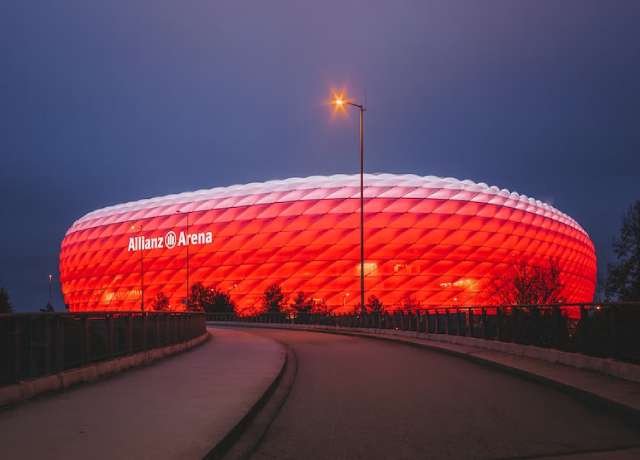As the UEFA EURO 2024 approaches, excitement builds for what promises to be a spectacular month of football from June 14 to July 14, 2024. Hosted by Germany, the tournament will see 24 teams compete across 10 venues in iconic cities, setting the stage for thrilling encounters and possibly new football legends.
A Closer Look at the Host Cities and Venues
Germany’s selection of venues for EURO 2024 showcases its deep football heritage and top-tier infrastructure. Each host city brings its unique flair and historical significance to the tournament, creating a vibrant match backdrop.
Berlin’s Olympiastadion, with a rich history dating back to its 1936 Olympics origins, will be at the heart of the tournament. It’s set to host the final on July 14, ensuring a dramatic conclusion to the championships. This stadium is not only an architectural wonder but a symbol of resilience and evolution, having been renovated several times to maintain its iconic status while upgrading its facilities to meet modern standards.
Munich’s Football Arena (Allianz Arena) is another key venue known for its futuristic facade that can light up in different colors. This stadium is synonymous with innovation and will kick off the tournament with the opening match on June 14. It’s a fitting venue given its reputation as one of the most modern and well-equipped stadiums in Europe.
Frankfurt Arena and Gelsenkirchen’s Arena AufSchalke (Veltins-Arena) are notable for their own unique features. Frankfurt Arena, set against the financial skyline of Frankfurt, combines rich football history with modern amenities, having hosted significant international matches in past tournaments. Gelsenkirchen, with its industrial heritage, features a technologically advanced stadium with a retractable roof and pitch, ensuring optimal conditions for matches regardless of weather.
Hamburg’s Volksparkstadion and Leipzig Stadium (Red Bull Arena) also play crucial roles. Hamburg’s venue has seen extensive use in past international tournaments and is noted for its robust atmosphere. Leipzig, often regarded as a vibrant cultural hub, offers a stadium within the historical Zentralstadion site, reflecting a blend of tradition and modernity.
Each of these venues reflects Germany’s commitment to delivering a world-class football experience, not only through their historical and cultural significance but also through their advanced facilities that cater to a global audience. This combination of tradition and innovation is set to make EURO 2024 a memorable event for fans and players alike.
Teams and Group Dynamics
The draw has placed teams into six intriguing groups. For instance, Group A includes Germany, Scotland, Hungary, and Switzerland, with a standout match between Germany and Scotland scheduled in Munich. Group B, termed the “Group of Tactical Titans,” features Spain, Croatia, Italy, and Albania, highlighting a must-watch clash between Spain and Italy in Gelsenkirchen.
Each group offers its unique set of challenges and narratives, with countries like Denmark and England in Group C aiming to leverage their recent performances to advance deep into the tournament. Meanwhile, Group D presents a “Clash of European Heavyweights” with France, the Netherlands, Poland, and Austria vying for supremacy.
Sustainability and Accessibility
The EURO 2024 is set to be more than just a football tournament; it’s an event that aims to lead by example in sustainability. With measures in place to minimize environmental impact and enhance social engagement, UEFA intends to use this platform to promote sustainability within football. Additionally, the accessibility of venues through public transportation is emphasized, ensuring that fans can enjoy the games conveniently and sustainably.
Engaging with EURO 2024: Media and Betting
As EURO 2024 captures the attention of fans worldwide, the role of media and betting platforms in enhancing the fan experience cannot be overstated. Podcasts, in particular, are gaining traction as a popular medium for in-depth discussions, previews, and analyses of the games. They offer a platform for experts and fans alike to share their insights and predictions, creating a community of informed and engaged supporters.
Additionally, the excitement around the tournament is further amplified by betting opportunities. Platforms like FanDuel Euro betting are at the forefront, providing fans with the chance to engage with the matches more directly by betting on outcomes, which naturally increases the stake and excitement of each game. This blend of media engagement and interactive betting ensures that EURO 2024 isn’t just a spectator sport but a comprehensive fan experience.
The Cultural Impact and Fan Experience
EURO 2024 is expected to be a culturally rich event, with fan zones in each host city where supporters can gather to watch the games and celebrate together. These zones will likely become hubs of festivity, offering a unique blend of football, culture, and community spirit.
Conclusion: Anticipation for a Summer of Football
As preparations continue, the anticipation for EURO 2024 only grows. This tournament is not just about crowning a new European champion; it’s about celebrating football’s unifying power. With a blend of seasoned teams and potential dark horses like Ukraine and Denmark, EURO 2024 promises to be a captivating showcase of talent, strategy, and passion on the global stage. Fans across Europe and beyond are set for what could be another memorable chapter in football history.











